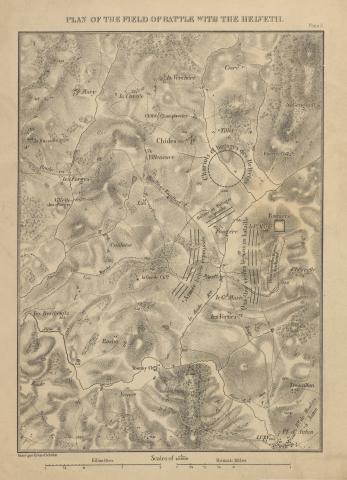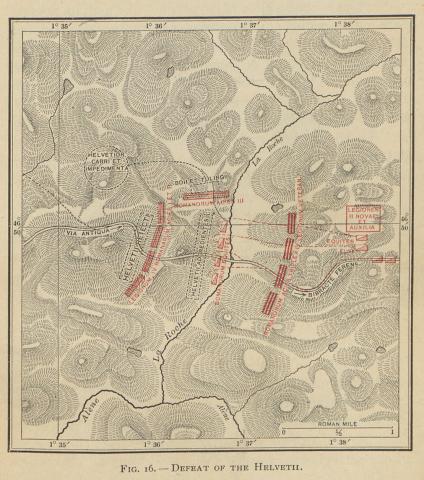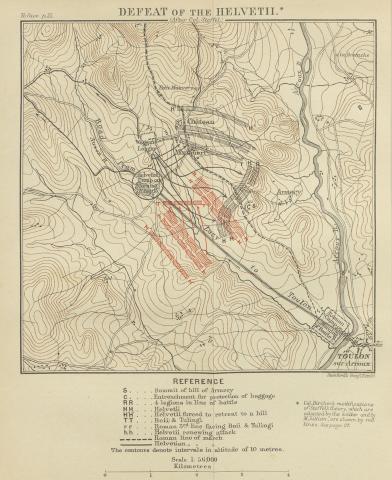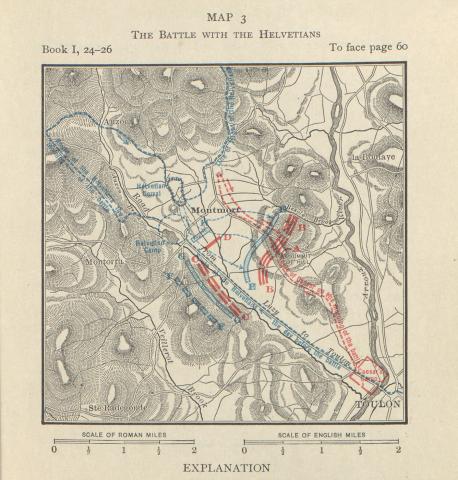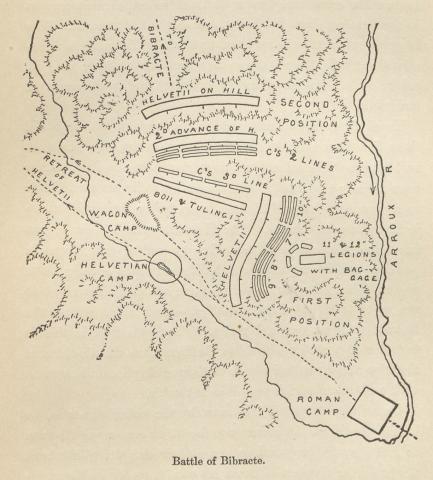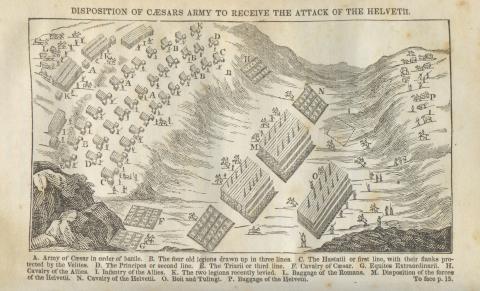The Helvetii are defeated and retreat to the country of the Lingones. Caesar pursues them.
ita: “thus,” i.e., as was said in 1.25 (Walpole).
ancipitī proeliō: “in a divided conflict” (Anthon), i.e., facing in both directions (A-G); “in a two-fold battle,” so called because fought on two different fronts (Harkness), i.e., between the first division and the Helvetii, and between the second division and the Boii / Tulingi (see the last sentence of 1.25). The phrase ancipitī proeliō commonly means “in doubtful conflict” (Anthon). Anceps is compounded of am- (for ambi), and ceps, contracted for capits, the stem of caput, and so means “two-headed” (M-T).
pugnātum est: impersonal passive expressions should not be translated literally: here, “they fought” (L-E), “the battle went on,” “the fighting continued,” or something of the kind (A-G).
diūtius cum: hyperbaton (H-T), where one would expect cum to begin the clause. Diūtius is put first for emphasis (Walpole).
alterī … alterī: “one party (i.e., the Helvetians, who had come down again from the mountain) … , the other party (i.e., the Boii and Tulingi) … ” (Anthon).
carrōs: arranged for defense around the corral (Kelsey). Impedīmenta et carrōs is a kind of hendiadys, since the carrī were the wagons on which the impedīmenta (“heavy baggage”) were transported (L-E).
sē contulērunt: “they retired,” still fighting; there was no disorderly rout (Kelsey).
nam: this sentence gives the reason for Caesar’s statement that the enemy withdrew, instead of fleeing in disorder (Walker).
hōc tōtō proeliō: “in the course of this whole battle,” i.e., at any time during it (M-T); ablative of time within which (AG 424 d) (Hodges).
cum … pugnātum sit: “although they fought” (Harkness); cum-clause with concessive force (AG 549). Note that the perfect subjunctive is an exception to the rule of sequence of tenses (Walker).
ab hōrā septimā: i.e., from a little past 1:00 p.m., counting from 6:00 a.m., when the last night-watch ended (M-T). Sunset was about 8:00 p.m., so that each of the twelve daylight hours was about an hour and a quarter of our time. In the Roman reckoning an hour was one-twelfth of the time, whether long or short, between sunrise and sunset, and varied from about forty-five minutes to an hour and a quarter (A-G).
vesperum: vesper is a noun of two declensions, with genitives vesperis and vesperī. In classical prose the ablatives vesperī and vespere (the former perhaps a locative), and accusative vesperum, are most common (M-T).
āversum hostem: This was not a flight, but an orderly retreat (Hodges). Caesar speaks with evident admiration of the bravery of the enemy (Kelsey).
ad multam noctem: “until late in the night” (AG 424 e) (A-G); “during a considerable part of the night” (Spencer).
ad impedimenta: “at / by the baggage” (Kelsey). Here, according to Plutarch, were the women and children, who were probably massacred when the Roman soldiers burst in (Hodges).
prō vāllō: “as a barricade” (A-G); “as a rampart” (H-T); “as a wall” (Hodges); “instead of a rampart.” This use of their wagons in battle was common among the Germans as well as the Gauls (M-T). The vāllum, strictly speaking, was the row of stakes on the wall of a Roman camp (L-E).
ē locō superiōre: “from the vantage-ground,” i.e., the height of the wagons packed in a circle (L-E). They mounted on the top of the wagons, and threw their spears down on their assailants (M-T). The mean cast of a javelin being about 25 yards, it would gain great strength even from so small an elevation as the height of the carts (Moberly).
in nostrōs venientēs: “against our men who were advancing,” literally “ours advancing” (Harkness).
coniciēbant … subiciēbant … vulnerābant: “kept hurling (from above) … kept thrusting (from below) … kept wounding” (A-G). Note the force of the imperfect, which accurately expresses the repetitive and continuous nature of these actions, vividly bringing out the details in the midst of the narrative (H-T).
rotās: these “wheels” in many cases were doubtless solid disks of wood, which Roman weapons would not pierce (Kelsey).
matarās ac trāgulās: “spears and darts” (Kelsey). These were peculiar forms of pike or lance used by the western nations of Europe (A-G). By matarae are meant a kind of Gallic lances, of greater weight than the ordinary spear; and by trāgulae, light javelins, with a strap attached, by which they were thrown. The Spanish matar, “to kill,” and the old French term matrasser, which have the same meaning, appear to be deduced from the same root with matara (Anthon).
subiciēbant: notice the force of sub-, “kept throwing from below [the wagons]” as the Roman soldiers attacked the rampart of carts (Kelsey).
vulnerābant: there must have been moonlight, or at least clear starlight, or else the Gauls could not have aimed their weapons so well (Kelsey).
diū cum esset pugnātum: “after a long fight.” Note again the hyperbaton; compare with diūtius cum above (H-T).
impedīmentīs castrīsque: castrīs is the “encampment,” i.e., the corral (Kelsey); ablative objects of potītī sunt (AG 410) (A-G).
potītī sunt: notice the use of tenses in the passage. The narrative proceeds as far as pugnātum est (historical perfect), then, as if answering a question why the fight continued thus, Caesar gives a description of the situation with pluperfect and imperfects: “The Gauls had made a rampart of their carts and from this they kept discharging missiles and using other means of defense.” Then the narrative is resumed in the clause with potītī sunt (A-G).
Orgetorigis fīlia: she would be the sister of the wife of Dumnorix (Stock). Plutarch (Vīta Caesaris, 18) informs us that the very women and children fought on this occasion till they were cut to pieces (Anthon).
ūnus ē fīliīs: with cardinal numbers the part of the whole is usually expressed by ē / ex or dē with ablative instead of with the partitive genitive (AG 346 c).
captus est: observe that the agreement is with the nearer subject, the masculine ūnus (A-G), though it applies also to fīlia in sense (Walpole).
hominum mīlia CXXX superfuērunt: The slaughter in this battle, which was probably fought on the plain of Cussy-la-Colonne, near Autun (Bibracte), in Burgundy, must have been enormous. According to 1.29 the number of Helvetii, etc., at the outset of their expedition was 368,000, with 92,000 being fighting men, the rest old men, women, and children. 130,000 survived the battle, so that we may infer what Plutarch tells us definitely (Vīta Caesaris, 18), that at the capture of the baggage-wagons, in which the women and children were carried on the march, the slaughter by the Romans was quite indiscriminate (M-T).
eaque: sc. mīlia (Stock)., referring to those thousands of survivors.
tōtā nocte: “during the entire night” (L-E); ablative of time within which (AG 423).
continenter: “without stopping” (Hodges). Of course no individual traveled every day and every night. There was only a panic-stricken mob, under no leadership, every member of which rested or moved on at his own pleasure, so that as a whole it was in ceaseless motion. Tonnerre is about a hundred miles north of the battlefield, and only the strongest could have traveled so far (Walker).
nūllam partem: this seems to imply that they fled day and night (Harkness). The accusative, by a Hellenism (AG 397 b), used for the ablative of specification. Many critics regard nūllam partem noctis itinere intermissō, as tautological, and a mere gloss of the adverb continenter in the previous clause (Anthon).
noctis itinere intermissō: “the night’s march broken / interrupted.” As the survivors seemly traveled at night only during the first night, the thought in nūllam … intermissō is substantially the same as that in eā … iērunt; such repetitions are characteristic of dictated matter (Kelsey).
in fīnēs Lingonum: about 60 Roman miles in a northwesterly direction from the battlefield (L-E), i.e., the southern part of Champagne. The chief town of that region, now Langres (the modern name is derived from Lingonēs (Stock)), is about ninety miles from Mt. Beuvray. It is very likely, however, that they reached the Lingones farther west. Napoleon III puts the end of their flight at Tonnerre, sixty miles west of Langres (A-G). It is almost certain that the battle took place near Montmort, a village about three miles from Toulon-sur-Arroux. Excavations have disclosed the form of the entrenchment on the hill, and have yielded bones, fragments of helmets and javelins, and other relics. The time was probably the last of June, or June 29, according to one authority (Hodges).
diē quārtō: this would be the third day, according to modern reckoning. The Romans counted the day from which the reckoning was made (Hodges).
cum … eōs sequī nōn potuissent: “since they could not pursue them” (L-E), i.e., the reason why they reached the Lingones in safety (M-T). This description of the situation is so clearly the cause of the main action that we may translate cum as “since” and refer the subjunctive to cum-causal (AG 549) (A-G).
propter … occīsōrum: gives the reason of morātī (A-G).
propter vulnera mīlitum: the victory must have cost the Romans dearly. Roman soldiers cared for their wounded companions (Kelsey).
propter sepultūram occīsōrum: “for the burial of the slain,” chiefly Gauls. The number of Gauls that perished in this battle has been estimated by some to be as high as 100,000, or even higher. Prompt burial was necessary for the health of the friendly Aeduans, in whose country Caesar was (Kelsey). The Romans were scrupulous in the observance of funeral rites, because they believed that the souls of the unburied dead were compelled to wander a hundred years on the banks of the Styx, before they could find rest (Harkness). In the most ancient times the Romans buried their dead; the custom of burning, adopted to some extent in early times, does not appear to have become general till the later times of the republic. Marius was buried, and Sylla was the first of the Cornelian gēns whose body was burned (Spencer).
triduum: = trēs diēs (Kelsey).
Lingonās: Greek form of the accusative, common in these names of tribes (A-G).
nūntiōs: “messages” to be delivered orally (Kelsey).
nē eōs frūmentō nēve aliā rē iuvārent: “[ordering them] that they should not … ” Iūvārent, “supply,” literally, “aid” (Kelsey), depends on litterās nūntiōsque mīsit, which implies the idea of commanding (Hodges). A substantive clause of purpose with subjunctive / indirect command (AG 563).
quī sī iūvissent: sc. eōs = Helvētiōs (Kelsey): “for that, if they should aid [them]” (Anthon); this protasis in direct discourse would be sī iūveritis (A-G), a future more vivid condition; the future perfect is replaced by pluperfect subjunctive when part of an indirect discourse.
sē eōdem locō quō Helvētiōs habitūrum: = sē (Lingonās) eōdem locō habitūrum (esse) quō Helvētiōs (habēret) (A-G): ‘he would regard them in the same light in which he did the Helvetii,” i.e., as enemies (Anthon).

